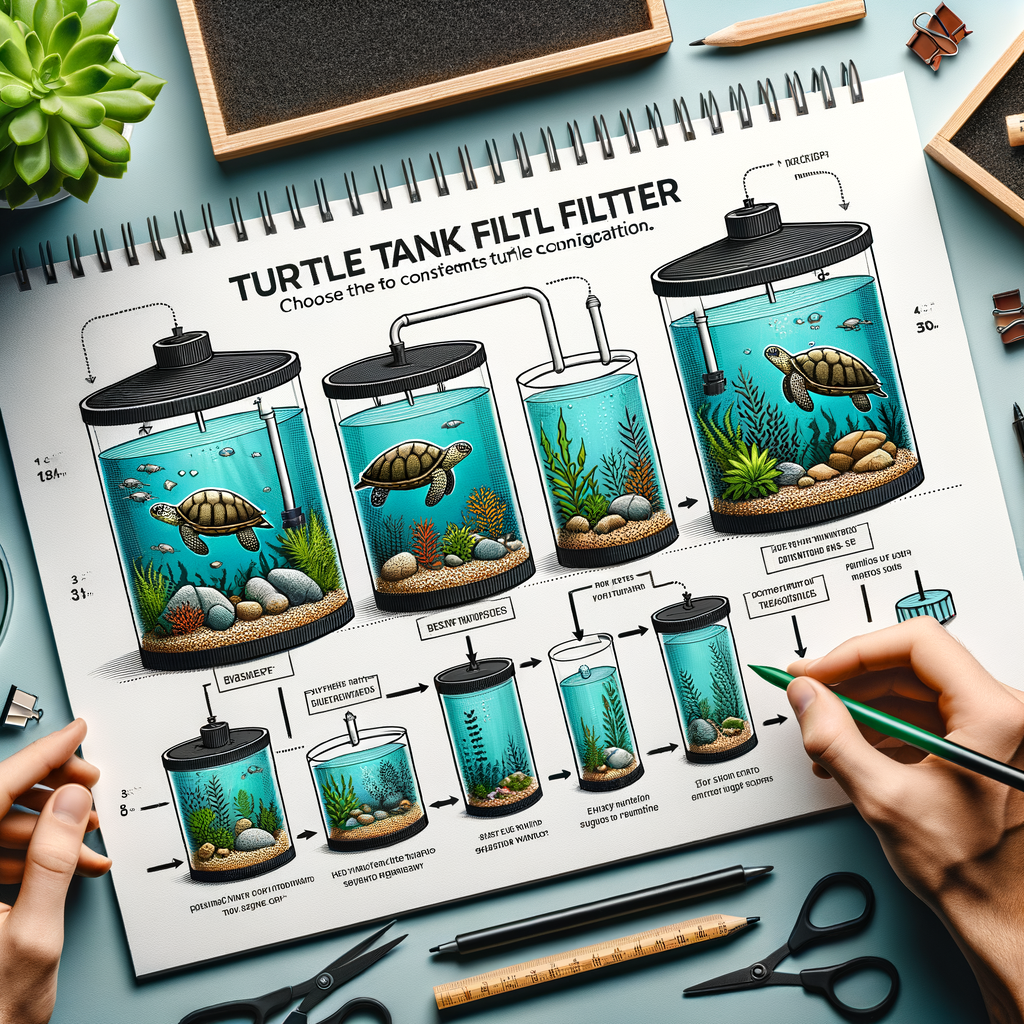
Introduction to Turtle Tank Filters
When it comes to keeping turtles as pets, one of the most important aspects to consider is their living environment. Just like fish, turtles live in water and require a clean and healthy environment to thrive. This is where a turtle tank filter comes into play.
- Importance of a Turtle Tank Filter
- Role of a Turtle Tank Filter in a Turtle’s Health and Well-being
A turtle tank filter is not just a gadget; it’s a necessity. It helps maintain the cleanliness of the tank by removing waste, uneaten food, and potentially harmful chemicals. Without a filter, the water in the turtle tank can quickly become dirty and unhealthy, which can lead to various health problems for your pet turtle.
The health and well-being of your pet turtle are directly linked to the cleanliness of its environment. A turtle tank filter plays a crucial role in ensuring this. It not only keeps the water clean but also helps in maintaining the right balance of beneficial bacteria. These bacteria help break down waste and prevent the growth of harmful bacteria and algae. A well-functioning filter can help prevent common turtle diseases, such as shell rot and respiratory infections.
In conclusion, a turtle tank filter is an essential piece of equipment for anyone who wishes to keep a turtle as a pet. It ensures the health and well-being of the turtle by maintaining a clean and balanced environment in the tank. In the following sections, we will guide you on how to choose the right filter for your turtle tank, how to install and set it up, and how to keep it running smoothly.
Choosing the Right Turtle Tank Filter
When it comes to the well-being of your pet turtle, selecting the right tank filter is crucial. The right filter not only keeps the water clean but also creates a healthy environment for your turtle to thrive. Let’s dive into understanding your turtle’s needs to make an informed decision.
Understanding Your Turtle’s Needs
Every turtle is unique, and so are their needs. It’s essential to understand the specific requirements of your turtle’s species and consider their size and age when choosing a filter. Here’s what you need to know:
- Species-specific requirements: Different turtle species have different needs. For instance, some turtles produce more waste than others, requiring a filter with a higher capacity. Research your turtle’s species to understand its specific needs better.
- Size and age considerations: The size and age of your turtle also play a significant role in choosing a filter. Younger and smaller turtles may not produce as much waste as larger, adult turtles. Therefore, a smaller filter might suffice for a young or small turtle, while a larger turtle might require a filter with a higher capacity.
Understanding your turtle’s needs is the first step towards choosing the right turtle tank filter. In the next sections, we will discuss the different types of filters and how to decide on the filter size based on your tank volume.
Filter Types: Which is the Best Filter for Turtle Tank?
When it comes to keeping your turtle tank clean and healthy, choosing the right filter is crucial. There are three main types of filters that are commonly used in turtle tanks: Canister Filters, Submersible Filters, and Power Filters. Let’s take a closer look at each of these to help you decide which is the best option for your turtle tank.
- Canister Filters
- Submersible Filters
- Power Filters
Canister filters are a popular choice for turtle tanks. They are known for their high filtration capacity and efficiency. This type of filter is external, meaning it sits outside the tank. It pulls water from the tank, filters it, and then pumps it back into the tank. Canister filters are great for larger tanks as they can handle a large volume of water and can filter out both large and small particles.
Submersible filters, as the name suggests, are placed directly into the tank. They are typically smaller than canister filters and are a good option for smaller tanks. Submersible filters are easy to install and maintain, making them a convenient choice. However, they may not be as efficient as canister filters in filtering out larger particles.
Power filters, also known as hang-on-back filters, are another type of external filter. They hang on the back of the tank and draw water up into the filter, where it is cleaned and then returned to the tank. Power filters are easy to use and maintain, and they provide good filtration for medium-sized tanks. However, they may not be suitable for larger tanks or tanks with a high volume of debris.
In conclusion, the best filter for your turtle tank depends on the size of your tank and the amount of debris your turtles produce. Canister filters are best for larger tanks, submersible filters are suitable for smaller tanks, and power filters are a good middle-ground option. Remember, a clean and healthy tank is essential for your turtle’s wellbeing.
Deciding on the Turtle Tank Filter Size
Choosing the correct size for your turtle tank filter is a crucial step in ensuring a healthy and clean environment for your turtle. This involves two key steps: calculating the volume of your tank and matching the filter capacity to the tank size.
- Calculating Tank Volume
Before you can select the right filter, you need to know the volume of your turtle tank. The volume is simply how much water your tank can hold. You can calculate this by multiplying the length, width, and height of your tank. If your tank measurements are in inches, convert them to gallons using this formula: Length (inches) x Width (inches) x Height (inches) divided by 231 equals volume in gallons.
For example, if your tank is 20 inches long, 10 inches wide, and 12 inches high, the volume would be approximately 10 gallons. This is a crucial piece of information because the size of the filter you need is directly related to the volume of your tank.
- Matching Filter Capacity to Tank Size
Once you know the volume of your tank, you can start looking for a filter that matches this capacity. The general rule of thumb is that your filter should be able to process all the water in your tank at least three to four times per hour. This means if you have a 10-gallon tank, you should look for a filter with a flow rate of at least 30 to 40 gallons per hour (GPH).
Remember, it’s better to have a filter that’s too big than one that’s too small. A larger filter will keep your tank cleaner and require less frequent maintenance. However, be careful not to choose a filter that is too powerful as it can create strong currents that are not suitable for turtles.
In conclusion, understanding your tank’s volume and matching it with the appropriate filter capacity is essential in maintaining a healthy and clean environment for your turtle. Always remember, a clean tank equals a happy and healthy turtle.
Turtle Tank Filter Guide: Installation and Setup
Setting up your turtle tank filter system is a crucial step in providing a healthy and clean environment for your aquatic pets. This guide will walk you through the process, step by step.
Setting Up Your Turtle Tank Filter System
Here are the key steps to setting up your turtle tank filter system:
- Placement of the Filter
- Connecting to Power Source
- Initial Filter Setup
The placement of your filter is crucial for its effectiveness. The filter should be placed in a location where it can easily draw in water and expel clean water. This is usually at one end of the tank, near the top. The filter should be fully submerged in water to function properly.
Once the filter is in place, it needs to be connected to a power source. Ensure the power cord is safely routed to avoid any risk of electrocution. Always remember to turn off the power before handling the filter or performing any maintenance tasks.
After connecting the filter to a power source, it’s time to set it up. This usually involves adding filter media, which helps clean the water. Follow the manufacturer’s instructions for this step. Once the filter is set up, turn on the power and let it run for a few hours before introducing your turtles to the tank.
Setting up your turtle tank filter system correctly is crucial for the health and happiness of your aquatic pets. By following these steps, you can ensure your turtles have a clean and healthy environment to thrive in.
Turtle Tank Maintenance: Keeping Your Filter Running Smoothly
Regular maintenance of your turtle tank filter system is essential to keep it running smoothly and efficiently. This includes cleaning the filter media, checking the water flow, and replacing any worn-out parts. Stay tuned for our next guide on turtle tank filter maintenance.
Conclusion: The Perfect Filter for Aquatic Turtles
Choosing and setting up the right filter for your turtle tank can seem daunting, but with the right guidance, it can be a simple and rewarding process. Remember, a well-maintained filter is key to providing a healthy and clean environment for your turtles.
Turtle Tank Maintenance: Keeping Your Filter Running Smoothly
Keeping your turtle tank filter running smoothly is crucial for the health and happiness of your pet. A well-maintained filter ensures clean and safe water, which is essential for your turtle’s wellbeing. Let’s delve into the regular cleaning and maintenance of your turtle tank filter.
Regular Cleaning and Maintenance
Regular cleaning and maintenance of your turtle tank filter are key to its efficient operation. This involves adhering to a cleaning schedule and replacing the filter media as required.
- Cleaning Schedule
- Replacing Filter Media
It’s recommended to clean your turtle tank filter at least once a month. However, if your tank is heavily populated, you might need to clean it more frequently. Regular cleaning prevents the build-up of waste and debris, which can clog the filter and reduce its effectiveness. Remember, a clean filter is a happy filter!
Filter media is the material inside your filter that traps and removes waste from the water. Over time, this media can become saturated and less effective. It’s generally recommended to replace your filter media every 2-3 months. However, this can vary based on the specific type of filter and the number of turtles in your tank. Always refer to the manufacturer’s instructions for specific guidance.
In conclusion, regular cleaning and maintenance are crucial for keeping your turtle tank filter running smoothly. By adhering to a regular cleaning schedule and replacing the filter media as required, you can ensure a clean and healthy environment for your pet turtle.
Troubleshooting Common Filter Problems
Even the best turtle tank filters can encounter problems. Here are some common issues you might face and how to fix them:
- Reduced Water Flow
- Noisy Operation
- Water Quality Issues
When the water flow in your turtle tank filter decreases, it could be due to a clogged filter media. This is often caused by debris or waste buildup. To fix this, you need to clean or replace the filter media. Make sure to do this regularly to prevent future issues.
A noisy filter can be a sign of a problem. This could be due to air trapped in the filter or a misaligned impeller. To solve this, try to reposition the impeller or remove the air by gently shaking the filter. Remember, a well-functioning filter should operate quietly.
If you notice a change in the water’s color or smell, it could be a sign of a filter problem. This could be due to inadequate filtration or a need to replace the filter media. Regular water testing can help you identify and address these issues promptly.
Remember, regular maintenance is crucial for the longevity of your turtle tank filter. By addressing these common problems, you can ensure a healthy and clean environment for your turtles.
Conclusion: The Perfect Filter for Aquatic Turtles
Choosing the perfect filter for your aquatic turtle’s tank is a critical decision that can significantly impact your pet’s health and happiness. In this article, we have covered all the essential aspects you need to consider when selecting and maintaining a turtle tank filter.
- Recap of key points:
- Final thoughts on choosing and maintaining the ideal turtle tank filter:
Remember, the best filter for your turtle tank depends on the size of the tank, the number of turtles, and their species. Canister filters are generally the most recommended due to their efficiency, but submersible and internal filters can also be suitable for smaller tanks or specific situations.
Installation and setup of the filter should be done carefully, following the manufacturer’s instructions. Regular maintenance, including cleaning and replacing parts when necessary, is crucial to keep the filter running smoothly and ensure the water quality in your turtle tank.
Choosing the right filter and maintaining it properly is not just about keeping the water clean. It’s about creating a healthy and comfortable environment for your aquatic turtles. Remember, a well-filtered tank is a happy home for your pet.
So, take your time, do your research, and make sure to choose a filter that suits your specific needs. And once you have it, don’t forget to maintain it properly. Your turtles will thank you for it!
In conclusion, the journey to finding the perfect filter for your aquatic turtles may require some effort, but the reward of seeing your pets thrive in a clean and healthy environment is undoubtedly worth it. So, equip yourself with the right knowledge, make informed decisions, and create the best home for your aquatic friends.














